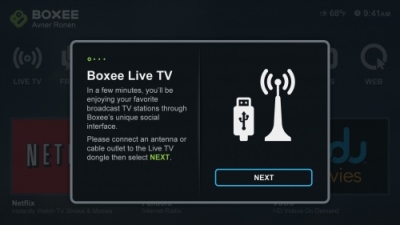Boxee and Comcast Reach Agreement, Developing System to Access Encrypted Basic Cable Channels

Back in February, Boxee and the Consumer Electronics Association announced that they were working together to convince the FCC not to overturn rules that required cable television service providers to offer basic tier channels unencrypted. The FCC had indicated that they were open to revisiting the rules regarding unencrypted cable channels as part of a required review of rules requiring service providers to offer both analog and digital transmissions. Cable television service providers, anticipating a relaxation of the rules requiring analog retransmission, were hoping to further streamline their digital offerings by turning on encryption for all tiers. Boxee, who had just recently released their Boxee Live TV add-on, was concerned that the move would shut them out as encryption would return cable television service to the days when every subscriber had to have a set top box all of the time.
In a filing with the FCC last week, Boxee and Comcast announced that they have come to an agreement and are working together to develop a system that would allow retail consumer electronics to access encrypted basic tier channels. Initially, the system would involve an ethernet-based digital transport adapter (E-DTA) that would sit between the set top box and the consumer electronics device. In the long term, their plan calls for a standard for an integrated E-DTA that would eliminate the need for a set top box or service provider supplied E-DTA. This does not appear to have any impact on the development of CableCard or AllVid, but would rather serve as a modern update on establishing cable-ready TVs and devices. Access for such devices would still be restricted to basic-tier channels. Although the agreement is only between Comcast and Boxee, the language does suggest that the two companies could offer the solution as an industry standard, however, without a timeline or specific details on which standards bodies would provide certification, it might be a good idea not to get one’s hopes up until other companies or organizations start to weigh in on the concept.
Boxee users may soon be able to access encrypted basic cable channels, thanks to an agreement with Comcast.
In a June 27 filing with the Federal Communications Commission, the companies said they have resolved a dispute over access to Comcast’s basic-cable tiers via devices like Boxee’s Live TV dongle.

don’t open it up, just buy a
don’t open it up, just buy a boxee box huh?
Was that Avner Ronen cackling
Was that Avner Ronen cackling in the background there?
Maybe I misread this article,
Maybe I misread this article, but this solution they came up with seems to not be locked to Boxee. Seems like other software manufacturers could take advantage of this. Did I read that correctly?
Yes and no. Based on comments
Yes and no. Based on comments from Boxee and Comcast and the filing the two companies made with the FCC, the solution they are working on is something that could be used by other CE device manufacturers and cable service providers, but not necessarily. The agreement is between Comcast and Boxee specifically and they appear to be the only companies specifically working on developing this specific adapter, but assuming that other parties were interested, the same basic technology and approach could be extended across the two industries. The tricky part will be getting enough companies on both sides of the fence to express an interest in development and testing which is where a certification body or two will eventually come into play. I suspect that the primary reason the companies went to the FCC with their agreement is to get the FCC to support their initiative and push other companies into joining in, though the more cynical argument would be that Comcast is simply looking to head off FCC concerns about changing the encryption rules by floating a possible solution that could end up being vaproware.